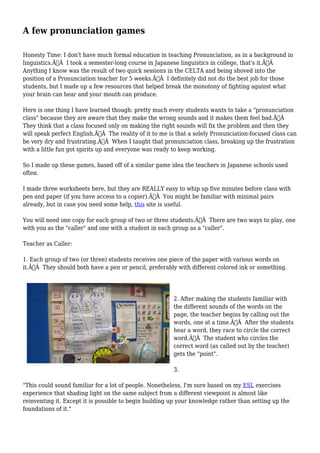
A few pronunciation games
- 1. A few pronunciation games Honesty Time: I don't have much formal education in teaching Pronunciation, as in a background in linguistics. I took a semester-long course in Japanese linguistics in college, that's it. Anything I know was the result of two quick sessions in the CELTA and being shoved into the position of a Pronunciation teacher for 5 weeks. I definitely did not do the best job for those students, but I made up a few resources that helped break the monotony of fighting against what your brain can hear and your mouth can produce. Here is one thing I have learned though: pretty much every students wants to take a "pronunciation class" because they are aware that they make the wrong sounds and it makes them feel bad. They think that a class focused only on making the right sounds will fix the problem and then they will speak perfect English. The reality of it to me is that a solely Pronunciation-focused class can be very dry and frustrating. When I taught that pronunciation class, breaking up the frustration with a little fun got spirits up and everyone was ready to keep working. So I made up these games, based off of a similar game idea the teachers in Japanese schools used often. I made three worksheets here, but they are REALLY easy to whip up five minutes before class with pen and paper (if you have access to a copier). You might be familiar with minimal pairs already, but in case you need some help, this site is useful. You will need one copy for each group of two or three students. There are two ways to play, one with you as the "caller" and one with a student in each group as a "caller". Teacher as Caller: 1. Each group of two (or three) students receives one piece of the paper with various words on it. They should both have a pen or pencil, preferably with different colored ink or something. 2. After making the students familiar with the different sounds of the words on the page, the teacher begins by calling out the words, one at a time. After the students hear a word, they race to circle the correct word. The student who circles the correct word (as called out by the teacher) gets the "point". 3. "This could sound familiar for a lot of people. Nonetheless, I'm sure based on my ESL exercises experience that shading light on the same subject from a different viewpoint is almost like reinventing it. Except it is possible to begin building up your knowledge rather than setting up the foundations of it."
- 2. Then the teacher will call out the next word, and the students race again for the correct word on their paper. The student who has circled the most correct words and gains the most "points" and wins the round. Student as Caller: 1. In groups of three, two students have different colored pens or pencils, and one student in the group will call out the words one by one. Like above, the other two students will race to circle the correct word. 2. The student with the most correct words circled wins. Note: This version is harder for all the students since the "caller" may not make the correct sounds, but if there is an error, the students are very likely to address it and the "caller" is made very aware that they are being misunderstood. Everyone in the group ends up repeating the difficult word multiple times and usually practicing the target pronunciation. If you are interested, here are the worksheets to try out on your own. (They are not the prettiest things...Working on formatting.) A basic minimal pair worksheet like below, download here.  The /e/ and /ɪ/ minimal pair worksheet like below can be found here. The consonant minimal pair /f/, /b/, and /v/ worksheet like below can be found here. Thanks for bearing with me in this article. I hope you did not mind spending your time regarding it. If you really liked it there are more about ESL news and also other matters on this site. Remember to check them out when you see fit and in case you've got any insights on this comment your ideas down below.